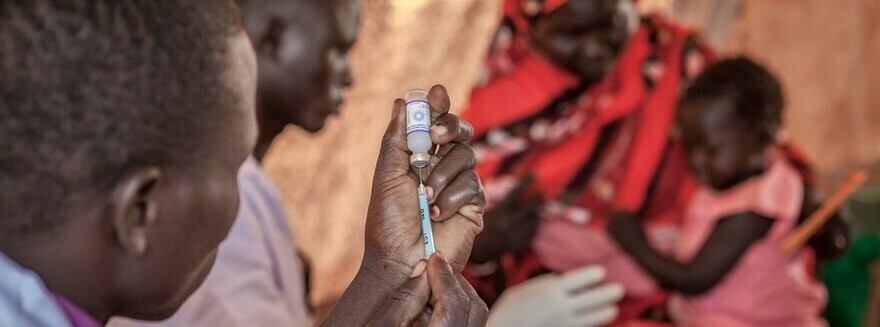Urgent measles vaccination campaign needed in Western Equatoria State

A measles crisis is escalating in South Sudan’s Western Equatoria State, coinciding with efforts to combat a yellow fever outbreak. Since February, seven deaths among children under five and 460 cases have been reported as of March 24th in three health facilities across Yambio and Nzara counties. Alarmingly, 90 percent of these children had never received measles vaccination.
With measles cases increasing and vaccination coverage critically low, Médecins Sans Frontières/Doctors Without Borders (MSF) is urging health authorities and the World Health Organization (WHO) to initiate an immediate vaccination campaign to prevent further spread of the disease.
Victoria John, mother of one-and-a-half-year-old Mark Emmanuel, shared her ordeal: “When my child fell sick, he had high fever, diarrhea, and cough. Despite giving him Paracetamol at home, there was no improvement. We then brought him to the MSF facility, where he received treatment for three days. If I hadn’t come to the facility, I fear my child would have died.”
Measles remains an ongoing emergency in South Sudan, with recurrent outbreaks straining healthcare systems and posing risks to communities. This year alone, over 12,000 cases have been recorded, with more than 400 cases reported just last week.
To address this crisis, MSF said its teams are providing measles treatment in Nzara and Yambio Counties through Gangura and Sakure health centers, as well as at Yambio State Hospital. Recognizing the escalating number of measles cases, MSF said “our team plans to expand the bed capacity for measles patients from 32 to 40.” MSF further said it is actively engaging with the community to identify children showing potential measles symptoms and referring them to health facilities.
A notable observation is that twenty percent of the children treated for measles at MSF-supported facilities are over the age of five. This underscores the necessity for a targeted vaccination campaign to reach this older age group, which was not covered by the existing expanded immunization program (EPI).
The measles outbreak compounds the challenges faced by a region grappling with yellow fever, with the most recent outbreak – the fourth in six years – declared by health authorities in December 2023. As of mid-March, 81 yellow fever cases, including three confirmed cases, and six deaths have been reported. In response, the Ministry of Health, in collaboration with WHO, conducted a yellow fever vaccination campaign, reaching approximately 357,000 people across three counties in Western Equatoria State. This campaign led to a decline in suspected and confirmed cases, underscoring the effectiveness of mass vaccination efforts.
“Large-scale vaccination campaigns are crucial, both in Western Equatoria state and Northern Bahr el Ghazal State, where ongoing measles outbreaks persist, to halt the spread of the disease and prevent further outbreaks. South Sudan’s fragile health system cannot withstand the burden of recurrent outbreaks,” emphasized MSF Head of Mission Zakaria Mwatia.
The low vaccination coverage in South Sudan significantly impacts the population, especially vulnerable children, who are susceptible to diseases like measles, which can result in severe health complications and fatalities. Given the severity of the health threats posed by measles and yellow fever, MSF advocates for intensified efforts to raise community awareness about these diseases and implement best practices to curb their transmission.
“It is imperative for the Ministry of Health and other health organizations, including WHO, to redouble their efforts to expand vaccination coverage nationwide, particularly in areas prone to disease outbreaks,” urged MSF Head of Mission Zakaria Mwatia.